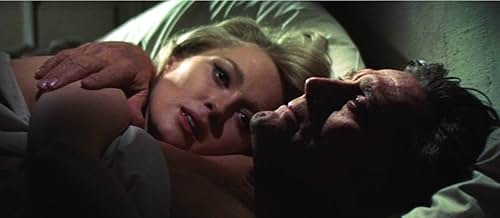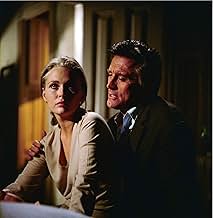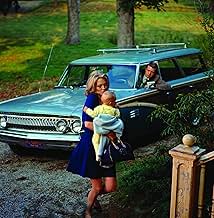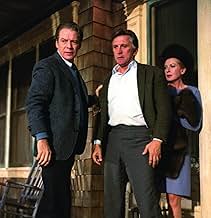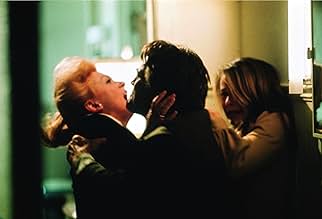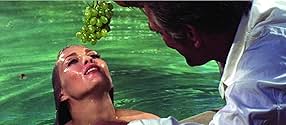CALIFICACIÓN DE IMDb
6.3/10
3.5 k
TU CALIFICACIÓN
Un publicista intenta reconstruir su vida destrozada después de sufrir una crisis nerviosa.Un publicista intenta reconstruir su vida destrozada después de sufrir una crisis nerviosa.Un publicista intenta reconstruir su vida destrozada después de sufrir una crisis nerviosa.
- Premios
- 1 premio ganado y 3 nominaciones en total
Carol Eve Rossen
- Gloria Anderson
- (as Carol Rossen)
E.J. André
- Uncle Joe
- (as E.J. Andre)
Donna Anderson
- Girl in Motel
- (sin créditos)
Brian Andrews
- Child
- (sin créditos)
Opiniones destacadas
In recent years I have come to reevaluate most of Elia Kazan´s films. "A Streetcar Named Desire" (1951) looks more and more the stagebound it is and belongs rather to its actors than to its director. "On the Waterfront" first of all is an elaborated excuse for informing (something Kazan had done some years earlier in front of the HUAC). "America, America" (1963) is the sort of tale immigrants who have made it tend to tell at family gatherings over and over again. On the other hand "Panic in the Streets" (1950) now emerges as a powerful thriller about paranoia. "The Visitors" (1972) - more or less a home movie - is a painfully depiction of America´s guilt with regard to the Vietnam War and as such much ahead of its time (most certainly much ahead of Brian De Palma´s "Casualties of War" (1988), that tells are rather similar story). The most astonishing film being "The Arrangement" (1969), a film that has been dismissed that often as a downright bomb that this verdict was taken for granted for a very long time. Well, it´s high time for a change.
"The Arrangement" deals with an advertising executive´s alienation from his job, his family, his world and even from himself. This Eddie Anderson is one of Kirk Douglas´s most touching and least mannered performances. He manages to keep the audience interested in a guy who is lost in almost every sense of the word. A gripping psychodrama, a film for adults and therefore out of place even at a time when traditional Hollywood was blown away by America´s very own New Wave. "The Arrangement" may at times annoy you, but it won´t insult your intelligence for even that long as a second. Cudos to the director, Kirk Douglas and both Richard Boone and Deborah Kerr who gave two performances to crown their already sterling careers. Faye Dunaway, by the way, has never before and never since been that erotic on screen.
"The Arrangement" deals with an advertising executive´s alienation from his job, his family, his world and even from himself. This Eddie Anderson is one of Kirk Douglas´s most touching and least mannered performances. He manages to keep the audience interested in a guy who is lost in almost every sense of the word. A gripping psychodrama, a film for adults and therefore out of place even at a time when traditional Hollywood was blown away by America´s very own New Wave. "The Arrangement" may at times annoy you, but it won´t insult your intelligence for even that long as a second. Cudos to the director, Kirk Douglas and both Richard Boone and Deborah Kerr who gave two performances to crown their already sterling careers. Faye Dunaway, by the way, has never before and never since been that erotic on screen.
Some pretty big names, right at, near, or just past their peaks... kazan, douglas, dunaway, kerr, cronyn. Ed anderson is an ad man. (the irony of the "clean" cigarette campaign.) he has a midlife crisis. And of course, we flash back to what brought him to this point. Everyone wants to know what really caused it... the doctors, the therapists, coworkers, his wife. At the center of all this is gwen, the office "assistant", who doesn't have any clear duties. And now eddie wants to take care of his father, who has dementia. It's a psychological-thinker film. Izzokay. Moves pretty slowly. And gets pretty heavy. Lots of yelling. It's all well done, but i can understand why people thought it was such a downer. And so long. Keep an eye out for harold gould.. he was "miles" on golden girls. Written and directed by elia kazan. According to the trivia section, this kind of became his swan song.
Deborah Kerr reportedly stopped doing movies after 1969 (even though she took film roles much later in life) because she no longer felt comfortable with the direction that the movie industry was going. After seeing "The Arrangement", I no longer question her sensitivity to the turbulent themes, language, and cinematography that was coming of age in the late 60's. On the surface, the film epitomizes many of the psychedelic themes of the era, from rampant flash-backs to cartoonized exclamations, such as "Bam!" and "Kerbloom!" splashing across the screen in bright neon colors. Beneath this, however, is the intensely challenging story of a man who wakes up one morning to discover that he detests the person that he has become. Kirk Douglas's Eddie Anderson will send chills up your spine as you watch him evolve from a successful advertising executive with the perfect house, the perfect job, and the perfect arrangement of both a wife and several mistresses, into a tormented, weakened man who despises himself enough to attempt suicide but believes in life enough not to carry through completely. His metamorphosis belies the chaotic style of the film; even though the erratic cinematography attempts to reflect his inner turmoil, the sense of peace that settles onto his face as the film progresses reveals that the reality of Eddie's mind is less insane than the reality of the world outside. He begins to see beyond the pretentions and fears that engulf the world around him and that had once turned him into a heartless executive,willing to convince consumers that cigarettes are good for them rather than lose a multi-million dollar client. Everyone around him, with the exception of Faye Dunaway, worships the "almighty dollar," and Eddie's release from this self-made prison allows him to make peace with himself, even as he makes enemies all around himself. Faye Dunaway is stunning and provocative as the insolent "office slut" who restores Eddie's faith in himself, ironically, by pointing out his flaws. In fact, she delivers what is possibly the most believable performance in the entire film, because her character, the strong, opinionated woman who accepts no sympathy for her decisions and weaknesses, has survived this tumultuous period much better than the character of say, the 60's housewife who desires nothing more than a maid, a swimming pool, and a wealthy husband. Deborah Kerr fills the role of Eddie's uncomprehending wife to perfection, even though anyone who has seen her in more flattering roles, as in her performance as Karen Holmes in "From Here to Eternity", won't be able to watch her portrayal of Florence Anderson without crying inwardly for the lost beauty of her earlier roles. Kerr is certainly ravishing in this film, despite the fruity-peach lipstick and the fluffy-headed hairstyle inflicted on her by the makeup department, but the uncertainty and bitterness that she plays to perfection in "The Arrangement" contrast sharply with the delicate mixture of sincerity and self-confidence that she exhibits in most of her early work. If you have not yet seen this film, make sure to read the book first. Elia Kazan's unique and personal style will illuminate the his meaning much more than any stylized cinematography could hope to. After reading the book, however, make sure to see the film, if only to admire the fine performances of the actors and to identify with the characters on a more immediate level. And, of course, just to watch the ever beautiful Deborah Kerr work her magic...
A sort of precursor to American Beauty and other modern fillms about dissatisfaction, Kazan's The Arrangment is an interesting attempt to characterize a man's deconstruction. Kirk Douglas plays Eddie, an advertising executive coming to terms with his job, his family, and his life's direction. Kazan experiments with montage, split narrative, and time span as he tells the story of a man looking for something new in life. The result is a compelling and relevant story about modern happiness that is broken apart by bizarre construction and confusing shot arrangement. Kazan has some interesting ideas here, but not all of them work. His split-consciousness portrayal of Eddie is sometimes confusing and distracting, as is the switch between past and present. Douglas is good as the lead; I don't see why Kazan would have chosen Brando in retrospect as I don't think it would have made much of a difference. Overall, a film worth seeing if you're a Kazan-freak, but otherwise stick with Streetcar, Eden, or Waterfront..
Elia Kazan's 1969 midlife-crisis epic is an x-ray of American manhood gone cuckoo for Cocoa Puffs. Kirk Douglas, icon of tortured machismo, plays Eddie Anderson, son of a tyrannical Greek merchant (Richard Boone) turned Madison Avenue sell-out. He sleeps in childlike separate beds with his wife (Deborah Kerr), who looks and acts more like his mother. He's obsessed with the one woman (Faye Dunaway) who looks at his barbered, Lavoris'd self and sees the Man He Could've Been. The sixties satire of Organization Man is stock, the bombast beats thick and hard, and, as per usual, Kazan can't resist the Big Moments that are thoroughbred Hollywood hokum. But it's impossible to deny that this is as anguishedly personal as any of Kazan's movies--and the machete hacking through the brush that cleared the way for Cassavetes, Scorsese and Ferrara. With its mod, PETULIA-style sets, balletic editing and penchant for stylized tricks, it's also the most goofily cinematic of Kazan's pictures--a Sam Fuller whirligig turned into a slick, upscale thirty-second spot.
¿Sabías que…?
- TriviaCritics were overwhelmingly negative when the film came out, and it was the consensus that Elia Kazan should never have filmed his own best-selling novel, which was panned by most literary critics as trash when it was published in 1967. It was widely known that the lead role had been turned down by Marlon Brando, who had garnered three Academy Award nominations and was awarded one Oscar under Kazan's direction at the beginning of his film career and was the heart and soul of some of Kazan's best work as a movie director. By the late 1960s, after a string of flops, most critics felt Brando was through as a movie star and that he desperately needed Kazan to turn his career around, both as an artist and as a box-office star. When the film came out, Kirk Douglas' lead performance was roundly panned, and most critics felt that even Brando at his best couldn't save what was, in essence, a melodramatic potboiler. The failure of "The Arrangement" was the end of Kazan's own career as an A-list director.
- ErroresWhen Eddie's father eats the piece of white bread, the number of bites and placement of the bread on the tray or his belly changes between shots.
- Créditos curiososExcept for the title, company logo and "A Film Written and Directed by Elia Kazan," all the remaining credits are at the end, which was still uncommon in those days.
- ConexionesEdited into Un Américain nommé Kazan (2018)
Selecciones populares
Inicia sesión para calificar y agrega a la lista de videos para obtener recomendaciones personalizadas
- How long is The Arrangement?Con tecnología de Alexa
Detalles
- Fecha de lanzamiento
- País de origen
- Sitios oficiales
- Idioma
- También se conoce como
- The Arrangement
- Locaciones de filmación
- Productora
- Ver más créditos de la compañía en IMDbPro
Taquilla
- Total a nivel mundial
- USD 9,536
Contribuir a esta página
Sugiere una edición o agrega el contenido que falta

Principales brechas de datos
By what name was El arreglo (1969) officially released in India in English?
Responda


